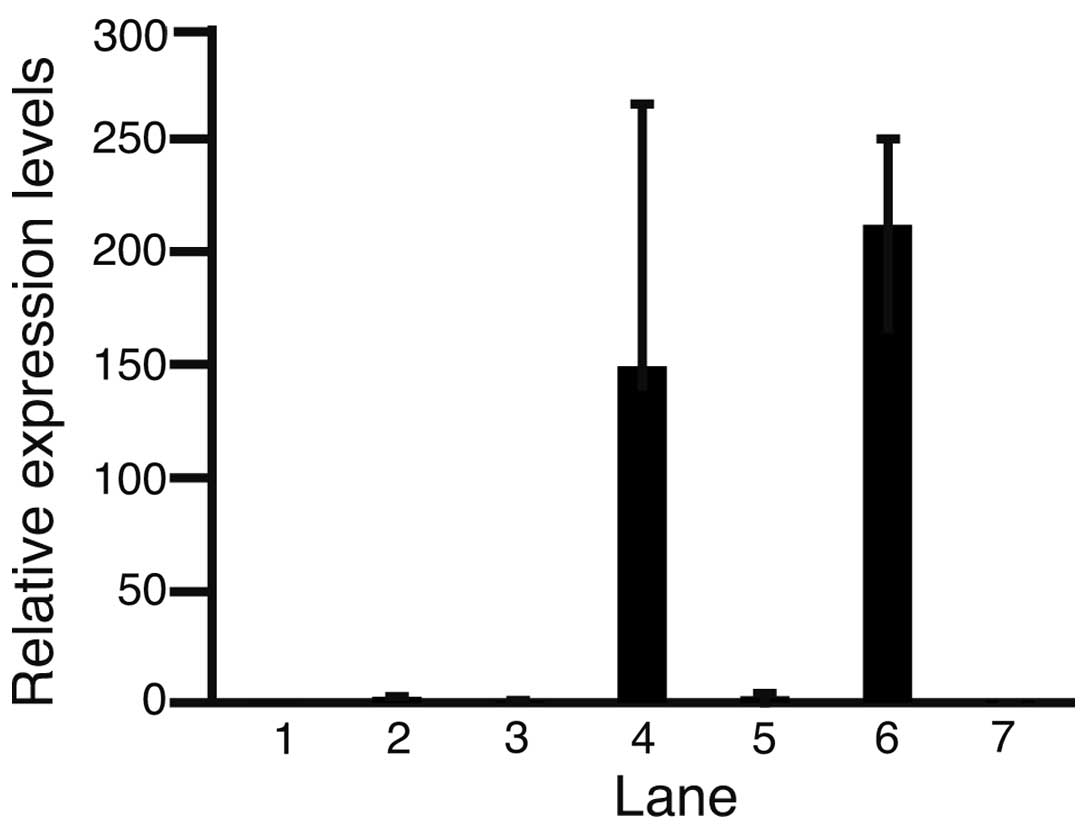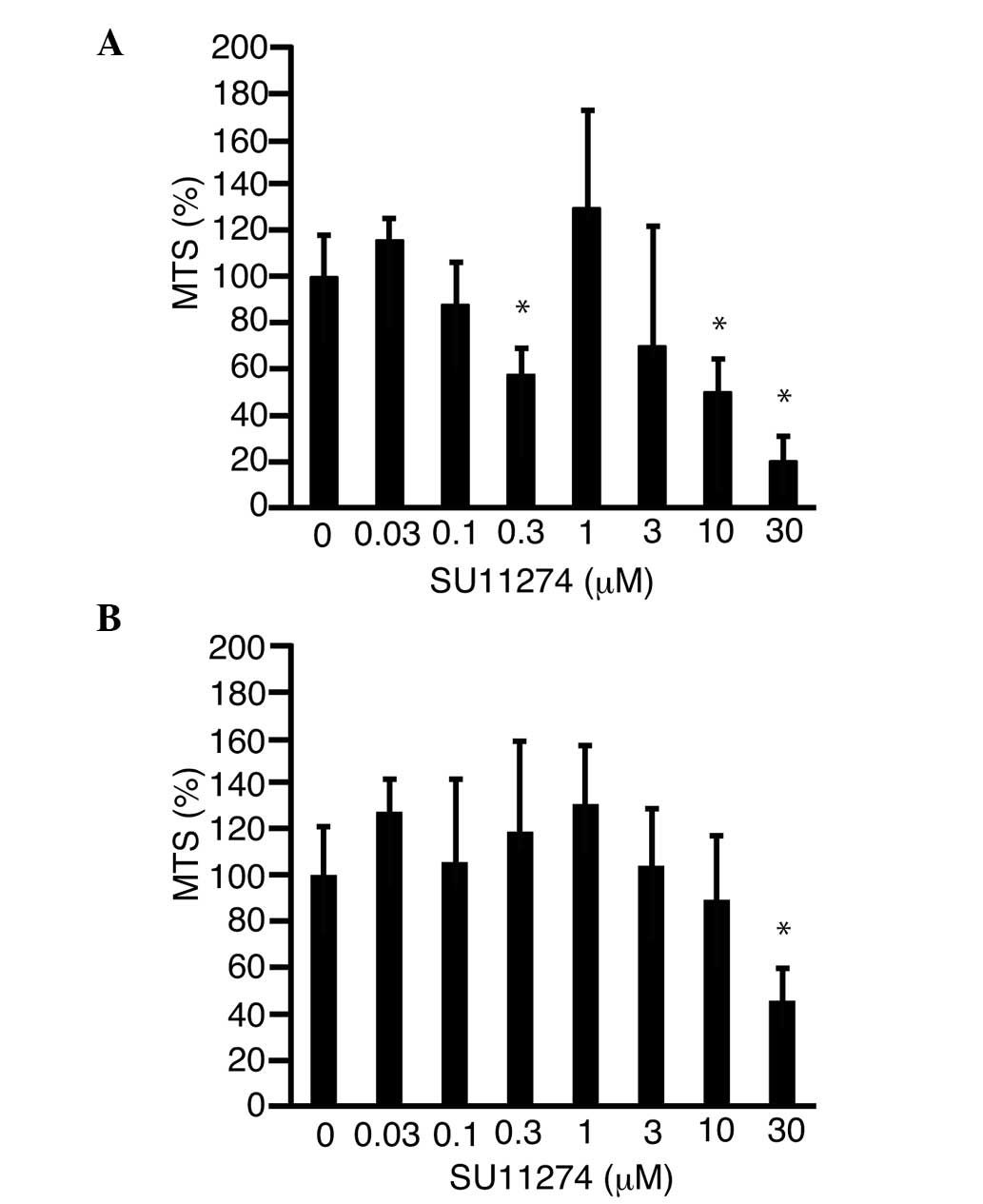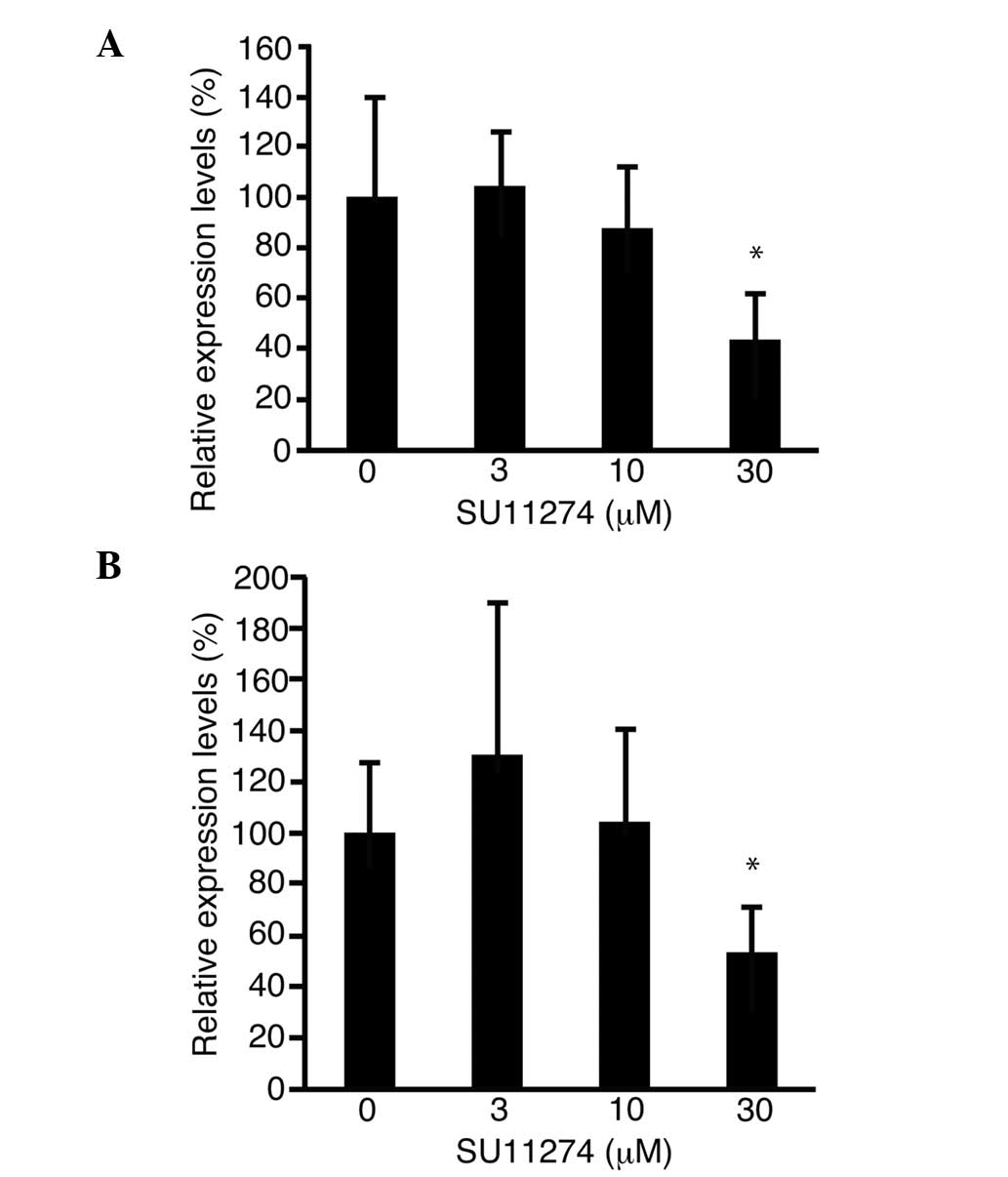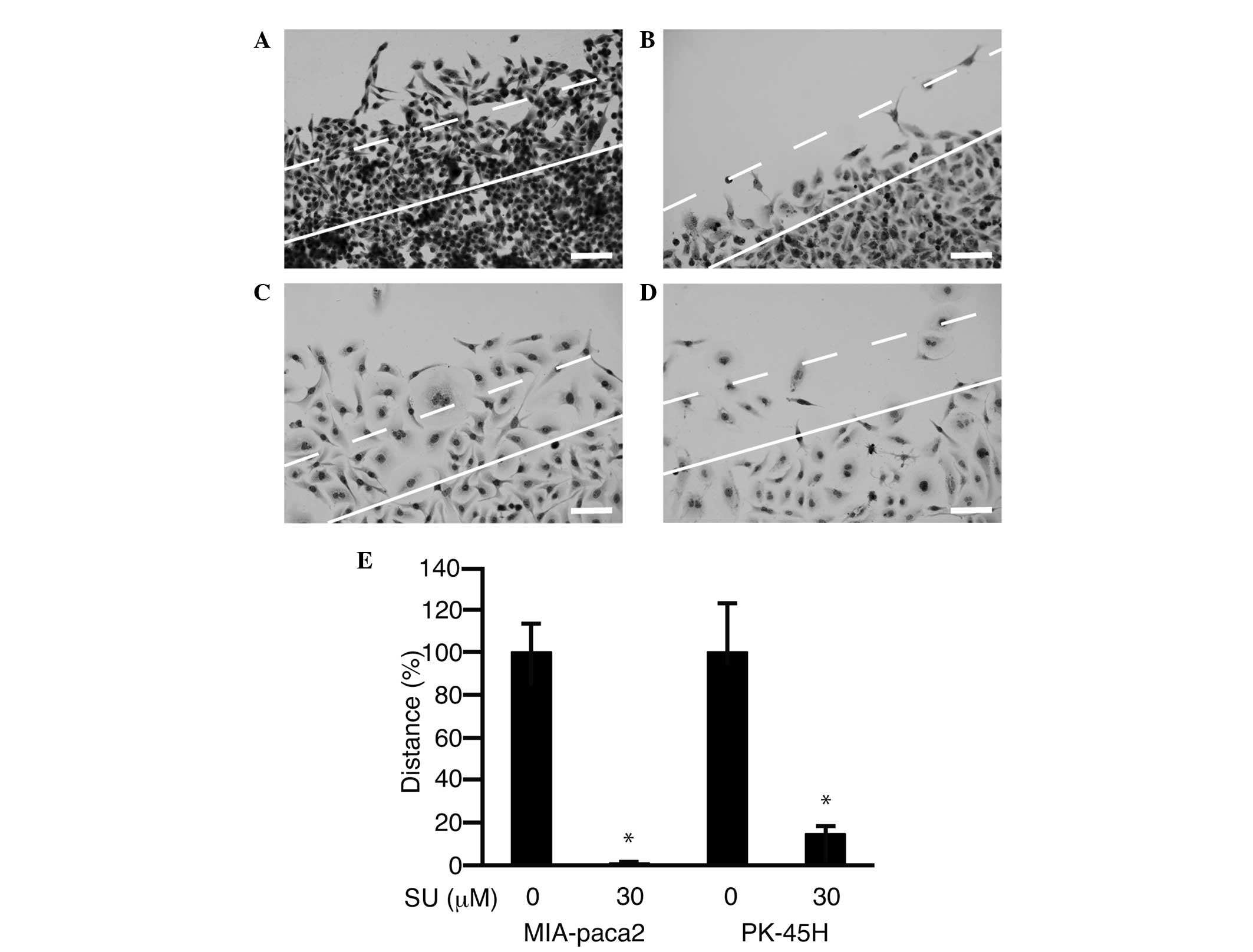|
1
|
Wörmann SM and Algül H: Risk factors and
therapeutic targets in pancreatic cancer. Front Oncol. 3:2822013.
View Article : Google Scholar : PubMed/NCBI
|
|
2
|
Lennon AM, Wolfgang CL, Canto MI, Klein
AP, Herman JM, Goggins M, Fishman EK, Kamel I, Weiss MJ, Diaz LA,
et al: The early detection of pancreatic cancer: What will it take
to diagnose and treat curable pancreatic neoplasia? Cancer Res.
74:3381–3389. 2014. View Article : Google Scholar : PubMed/NCBI
|
|
3
|
Gresham GK, Wells GA, Gill S, Cameron C
and Jonker DJ: Chemotherapy regimens for advanced pancreatic
cancer: A systematic review and network meta-analysis. BMC Cancer.
14:4712014. View Article : Google Scholar : PubMed/NCBI
|
|
4
|
Organ SL and Tsao MS: An overview of the
c-MET signaling pathway. Ther Adv Med Oncol. 3 (Suppl):S7–S19.
2011. View Article : Google Scholar : PubMed/NCBI
|
|
5
|
Goetsch L, Caussanel V and Corvaia N:
Biological significance and targeting of c-Met tyrosine kinase
receptor in cancer. Front Biosci (Landmark Ed). 18:454–473. 2013.
View Article : Google Scholar : PubMed/NCBI
|
|
6
|
Zhu GH, Huang C, Qiu ZJ, Liu J, Zhang ZH,
Zhao N, Feng ZZ and Lv XH: Expression and prognostic significance
of CD151, c-Met, and integrin alpha3/alpha6 in pancreatic ductal
adenocarcinoma. Dig Dis Sci. 56:1090–1098. 2011. View Article : Google Scholar : PubMed/NCBI
|
|
7
|
Vilá MR, Nakamura T and Real FX:
Hepatocyte growth factor is a potent mitogen for normal human
pancreas cells in vitro. Lab Invest. 73:409–418. 1995.PubMed/NCBI
|
|
8
|
Li C, Wu JJ, Hynes M, Dosch J, Sarkar B,
Welling TH, Pasca di Magliano M and Simeone DM: c-Met is a marker
of pancreatic cancer stem cells and therapeutic target.
Gastroenterology. 141:2218–2227. 2011. View Article : Google Scholar : PubMed/NCBI
|
|
9
|
Jin H, Yang R, Zheng Z, Romero M, Ross J,
Bou-Reslan H, Carano RA, Kasman I, Mai E, Young J, et al: MetMAb,
the one-armed 5D5 anti-c-Met antibody, inhibits orthotopic
pancreatic tumor growth and improves survival. Cancer Res.
68:4360–4368. 2008. View Article : Google Scholar : PubMed/NCBI
|
|
10
|
Mughal A, Aslam HM, Sheikh A, Khan AM and
Saleem S: c-Met inhibitors. Infect Agent Cancer. 8:132013.
View Article : Google Scholar : PubMed/NCBI
|
|
11
|
Gardian K, Janczewska S and Durlik M:
Microenvironment elements involved in the development of pancreatic
cancer tumor. Gastroenterol Res Pract. 2012:5856742012. View Article : Google Scholar : PubMed/NCBI
|
|
12
|
Inagaki Y, Qi F, Gao J, Qu X, Hasegawa K,
Sugawara Y, Tang W and Kokudo N: Effect of c-Met inhibitor SU11274
on hepatocellular carcinoma cell growth. Biosci Trends. 5:52–56.
2011. View Article : Google Scholar : PubMed/NCBI
|
|
13
|
Yasui T, Ohuchida K, Zhao M, Onimaru M,
Egami T, Fujita H, Ohtsuka T, Mizumoto K and Tanaka M: Tumor-stroma
interactions reduce the efficacy of adenoviral therapy through the
HGF-MET pathway. Cancer Sci. 102:484–491. 2011. View Article : Google Scholar : PubMed/NCBI
|
|
14
|
Chan B, VanderLaan PA and Sukhatme VP:
6-Phosphogluconate dehydrogenase regulates tumor cell migration in
vitro by regulating receptor tyrosine kinase c-Met. Biochem Biophys
Res Commun. 439:247–251. 2013. View Article : Google Scholar : PubMed/NCBI
|
|
15
|
Tomizawa M, Kondo F and Kondo Y: Growth
patterns and interstitial invasion of small hepatocellular
carcinoma. Pathol Int. 45:352–358. 1995. View Article : Google Scholar : PubMed/NCBI
|
|
16
|
Neesse A, Krug S, Gress TM, Tuveson DA and
Michl P: Emerging concepts in pancreatic cancer medicine: Targeting
the tumor stroma. Onco Targets Ther. 7:33–43. 2013. View Article : Google Scholar : PubMed/NCBI
|
|
17
|
Pant S, Saleh M, Bendell J, Infante JR,
Jones S, Kurkjian CD, Moore KM, Kazakin J, Abbadessa G, Wang Y, et
al: A phase I dose escalation study of oral c-MET inhibitor
tivantinib (ARQ 197) in combination with gemcitabine in patients
with solid tumors. Ann Oncol. 25:1416–1421. 2014. View Article : Google Scholar : PubMed/NCBI
|
|
18
|
Avan A, Caretti V, Funel N, Galvani E,
Maftouh M, Honeywell RJ, Lagerweij T, Van Tellingen O, Campani D,
Fuchs D, et al: Crizotinib inhibits metabolic inactivation of
gemcitabine in c-Met-driven pancreatic carcinoma. Cancer Res.
73:6745–6756. 2013. View Article : Google Scholar : PubMed/NCBI
|
|
19
|
Tomizawa M, Shinozaki F, Sugiyama T,
Yamamoto S, Sueishi M and Yoshida T: Insulin-like growth factor-I
receptor in proliferation and motility of pancreatic cancer. World
J Gastroenterol. 16:1854–1858. 2010. View Article : Google Scholar : PubMed/NCBI
|
|
20
|
Tomizawa M, Shinozaki F, Sugiyama T,
Yamamoto S, Sueishi M and Yoshida T: Insulin-like growth factor I
receptor involvement in proliferation of NOR-P1 cells in serum-free
media. J Cell Biochem. 113:2714–2720. 2012. View Article : Google Scholar : PubMed/NCBI
|
|
21
|
Ucar DA, Magis AT, He DH, Lawrence NJ,
Sebti SM, Kurenova E, Zajac-Kaye M, Zhang J and Hochwald SN:
Inhibiting the interaction of cMET and IGF-1R with FAK effectively
reduces growth of pancreatic cancer cells in vitro and in vivo.
Anticancer Agents Med Chem. 13:595–602. 2013. View Article : Google Scholar : PubMed/NCBI
|
|
22
|
Tomizawa M, Shinozaki F, Sugiyama T,
Yamamoto S, Sueishi M and Yoshida T: Frizzled-2: A potential novel
target for molecular pancreatic cancer therapy. Oncol Lett.
7:74–78. 2014.PubMed/NCBI
|



















